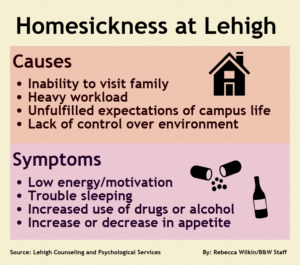 Angel Oi Yee Cheng cried throughout most of her first two weeks at Lehigh when she arrived on campus to pursue her master’s degree in August 2013.
Angel Oi Yee Cheng cried throughout most of her first two weeks at Lehigh when she arrived on campus to pursue her master’s degree in August 2013.
The Hong Kong native, who has since completed her master’s in Globalization and Education and is in the midst of obtaining her doctorate in Comparative and International Education at Lehigh, found herself struggling to adjust to her new surroundings and deeply missing home.
“What am I doing here?” Cheng asked herself. “Why did I come here?”
The Lehigh University Counseling and Psychological Services website lists homesickness as one of the challenges students face in college, citing that serious cases might result in “low energy or motivation, having difficulty with school, use of drugs or alcohol, pervasive unhappiness or displeasure, and lack of interest or involvement in new surroundings.” These challenges become all the more real when a student is not just getting acclimated to being away from home and adjusted to college life, but entering a new country and culture.
First-years and international students are the two subgroups of the college population most likely to experience homesickness.
According to the “Lehigh at a Glance” student profile on Lehigh’s website, 25 percent of students are from New Jersey, 24 percent are from Pennsylvania and 15 percent are from New York, which can make going home on weekends a feasible option for a majority of domestic Lehigh students.
Katie Connors, a postdoctoral resident at the Counseling Center, said the professionals there typically advise students dealing with homesickness to try to become more involved on campus, to push themselves to make new friends and to implement new routines.
“We will probably tell students to take this discomfort they’re dealing with and let it motivate them to go find their new home here and make this their home,” Connors said. “We definitely encourage people to socialize and persist through that discomfort by maybe spending a couple extra weekends here and not going home every weekend to really try to get used to being here.”
But international students don’t have the opportunity to go home every weekend. To help them acclimate to life at Lehigh, the Office of International Students and Scholars hosts an orientation specifically for international students a week prior to either first-year orientation for incoming undergraduates or department orientations for graduate students.
Jen Topp, the director of global engagement at the Office of International Affairs, said these orientation sessions range from dealing with English as a second language issues to Lehigh 101 and America 101 sessions to help international students adjust to their new cultural surroundings.
Topp described a bell curve of culture shock in which international students are usually in what is called the “honeymoon phase” when they first arrive at Lehigh, but the second phase — anxiety — can arise as they start to settle into their new routines.
“Our international students are usually very excited to get here — this may have been their family’s entire dream, and their family might have put all of their money into it for one person to come,” Topp said. “So they may be nervous, but they’re excited, and they’re definitely in that honeymoon phase. And then they start realizing that things are different here and they start to go, ‘Oh, they do things weird or in a different way than I would at home,’ and they start to get into the day-to-day here, and they start to get homesick because it’s hard.”
To provide international students with a resource they can turn to throughout the entire transition process and to help them move into the last two stages of the culture shock bell curve — adjustment and acceptance — the Office of International Students and Scholars encourages international students to develop close ties with their international orientation leaders, comprised of both other international and domestic students.
These international orientation leaders are trained in intercultural and cross-cultural communication, as well as cultural identity.
“We found out through last fall’s orientation that students who had bonded with their orientation leaders had an easier time transitioning to campus life here,” said Jeanne Ma, an assistant director of the Office of International Students and Scholars. “Bonding with their orientation leader lets them know that it’s possible to make friends with Americans, that it’s not scary, and that you don’t need to have perfect English to make friends with Americans because they already did that with their orientation leaders.”
Nilufar Kabulova is an international student from Uzbekistan who completed her master’s degree in political science in the fall of 2016 and is now working for a local nonprofit.
She lived away from her family even when she was going to school in Uzbekistan, which she said made dealing with homesickness at Lehigh easier. But there are times, she said, when she does find homesickness difficult to deal with.
“During the holidays or birthdays, I get really homesick,” Kabulova said. “At home in Uzbekistan, we celebrate in such festive, awesome, loud, music- and food-filled ways that I can’t really get here. I try to get close to it with my family of friends, and we try to celebrate holidays close to our home countries’ standards, which makes it easier. But when the thought hits you that you’re on a whole other continent, sometimes you feel kind of stuck and you can’t go home even if you want to, which can definitely be sad.”
Junior mechanical engineering major Antonio Berjillos, who is a native of Spain, said he too found dealing with homesickness at Lehigh easier because parts of his education had already taken place in the United States.
Berjillos spent his sophomore and senior years of high school in Vermont and struggled with homesickness more during those years than at Lehigh. He credits finding a group of Spanish-speaking friends at Lehigh with helping him to feel at home here.
“My first semester, I wasn’t as happy here as my (other) semesters, and I think that’s because I didn’t spend much time with Spanish-speaking people,” Berjillos said. “It has definitely helped me a lot. If you don’t find a good group of friends who are welcoming and who you’re able to spend a lot of time with, I can understand how people end up feeling very homesick and wanting to go home.”
Berjillos said two of his best friends from freshman year — one from Singapore and one from Germany — went back to their home countries and never returned to Lehigh.
Ma said she has seen international students withdraw from Lehigh to go home, but she believes a large reason for that is the struggle to adjust to the American education system rather than homesickness.
“At college in America, you’re not being reminded constantly to do your homework and study for your quizzes, and some international students don’t realize that their final grade is based on more than their final exam,” Ma said. “When they realize that their homework counts, their quizzes count, their projects count, and even their attendance, they panic. I’ve seen students withdraw because they don’t think they’re going to get a good grade and they don’t want to have a bad record, so they’d rather go home and come back again to start fresh.”
For the international students who do stay at Lehigh but continue to struggle with homesickness, Cheng encourages them to get involved in campus life. She said serving as the graduate assistant for the Global Union has helped her find her comfort zone at Lehigh.
“I think the students who are very active and involved are able to overcome their homesickness,” Cheng said. “Before I got involved in the Global Union, I missed home much more. Now I’m totally immersed into the campus environment, and I don’t miss home as much.”





Comment policy
Comments posted to The Brown and White website are reviewed by a moderator before being approved. Incendiary speech or harassing language, including comments targeted at individuals, may be deemed unacceptable and not published. Spam and other soliciting will also be declined.
The Brown and White also reserves the right to not publish entirely anonymous comments.
2 Comments
No question about it, being an international student away from home is difficult, compounded by our complex culture and language problems. Welcoming and assimilation assistance must come from numerous sources to aid these young people embarking on life’s journey. Most struggle in their efforts and need guidance from schools’ international departments, immigration protection, host families, concerned neighbors and fellow students, and even informative books to extend a cultural helping hand so we all have a win-win situation.
Something that might help anyone coming to the US is the award-winning worldwide book/ebook “What Foreigners Need To Know About America From A To Z: How to Understand Crazy American Culture, People, Government, Business, Language and More.” Used in foreign Fulbright student programs and endorsed worldwide by ambassadors, educators, and editors, it identifies how “foreigners” have become successful in the US, including students.
It explains how to cope with a confusing new culture and friendship process, and daunting classroom differences. It explains how US businesses operate and how to get a job (which differs from most countries), a must for those who want to work with/for an American firm here or overseas.
It also identifies the most common English grammar and speech problems foreigners have and tips for easily overcoming them, the number one stumbling block they say they have to succeeding here.
Good luck to all wherever you study or wherever you come from, because that is the TRUE spirit of the American PEOPLE, not a few in government who shout the loudest!
Homesickness is, without an ounce of doubt, one of the most commonly experienced phenomena among international students. When I moved to Australia from India a year ago, I found it extremely hard (almost impossible) to cope with the change. I missed my family back home, especially when I was sick and had nobody to take care of me. However, one thing that helped me grapple with the homesickness was keeping myself busy. I pursued several hobbies and joined University clubs to keep my mind distracted. A year gone by, I’m glad to be here.